The space, located on the first floor of the McShane Campus Center, has been transformed to make it easier to create fresh, customized dishes in an open environment while providing ample space for students and staff to socialize and recharge. The renovation is among the final phases of the McShane Center construction project.
There also was a celebration of the space on Monday, Sept. 16, filled with special offers and food demonstrations.
New Stations, New Dishes
Visitors to the new Marketplace will be greeted by nine stations, covering cuisine ranging from halal, deli, and grill to pizza, salad, vegan, allergen-friendly, and dessert.
Deming Yaun, University dining contract liaison, touted a variety of new dishes, including a ramen meal with roasted pork, baby bok-choy, carrots, scallions, and chili garlic sauce, as well as a sautéed shrimp and spaghetti dish with chipotle cream sauce. He said that in the previous space, roughly 30% of food was prepared in front of students; in the new space, nearly 70% of the food is prepared in the open.
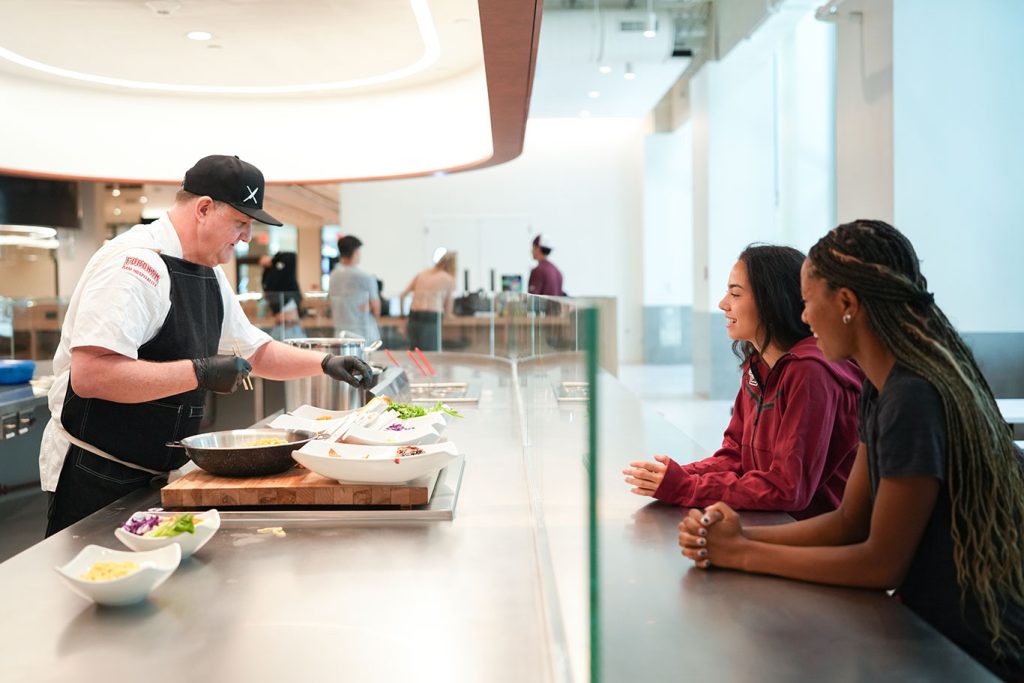
Starting Off Fresh
The first station that visitors encounter upon entering, the vegetarian and vegan station, sets the tone for the new space. Just as supermarket customers are greeted by aisles of fresh produce, Marketplace customers will be greeted by everything they need to put together delicious plant-based dishes. The dishes are part of a commitment to help Fordham lower its carbon footprint by using ingredients that have a low impact on the environment.
In recent years, “students are really gravitating towards more plant-based options,” Yaun said. “It’s a statement of freshness that the station is making that is carried through the whole facility.”
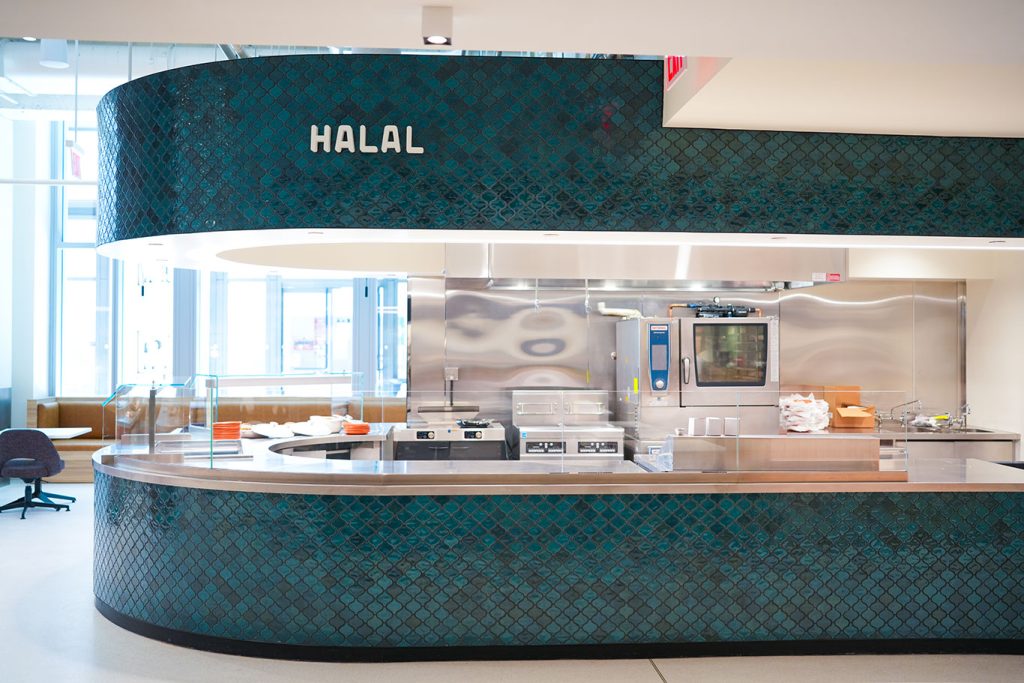
Space For Everyone
Seating arrangements are diverse: booths, tall tables, long tables, and benches are situated throughout, welcoming everyone from single diners looking to work through lunch to big groups gathering for a communal meal. One dining room can be sectioned off for private gatherings. Altogether, the space can accommodate nearly 800 diners.
One addition that foodies will want to keep an eye on is the Chef’s Table. The space will serve as a hub for cooking demonstrations and a place for chefs to share their experimental dishes.
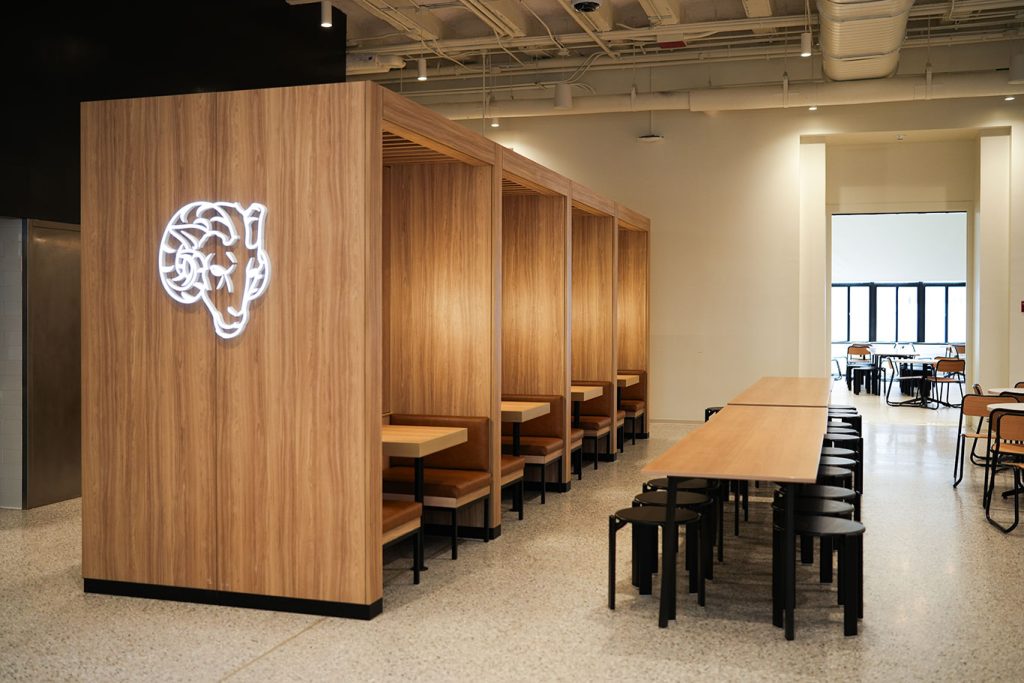
A Place to Refuel and Relax
Audrey Hayes, a senior at Fordham College at Rose Hill who got an early tour of the space as part of a student group, said she was eager to try the fresh pasta. She said she could see herself grabbing a booth by the entrance.
“When I study, I like to have a little bit of noise, so I find myself studying in the cafe sometimes,” she said.
Andres Perez, also a senior at Fordham College at Rose Hill, was excited to see a table big enough that the baseball team could use for a post-practice gathering. Perez, who pitches for the Rams, was intrigued by the halal station, where he’ll be able to get chicken and rice with a salad.
“It’s nice that it’s going to be an everyday option now,” he said.
James Serruto, FCRH ’24, who was chairman of the United Student Government Facilities and Dining Committee last year, said that transparency of food preparation was a big concern for students, who met with administrators weekly while the Marketplace was under construction.
He likes that the space will create opportunities for students to get to know the kitchen staff.
“It’s very easy to go over to the chicken fingers and fries, but when you know that somebody’s preparing a steak in front of you or preparing a healthy salad, it builds a sense of trust and understanding,” he said.
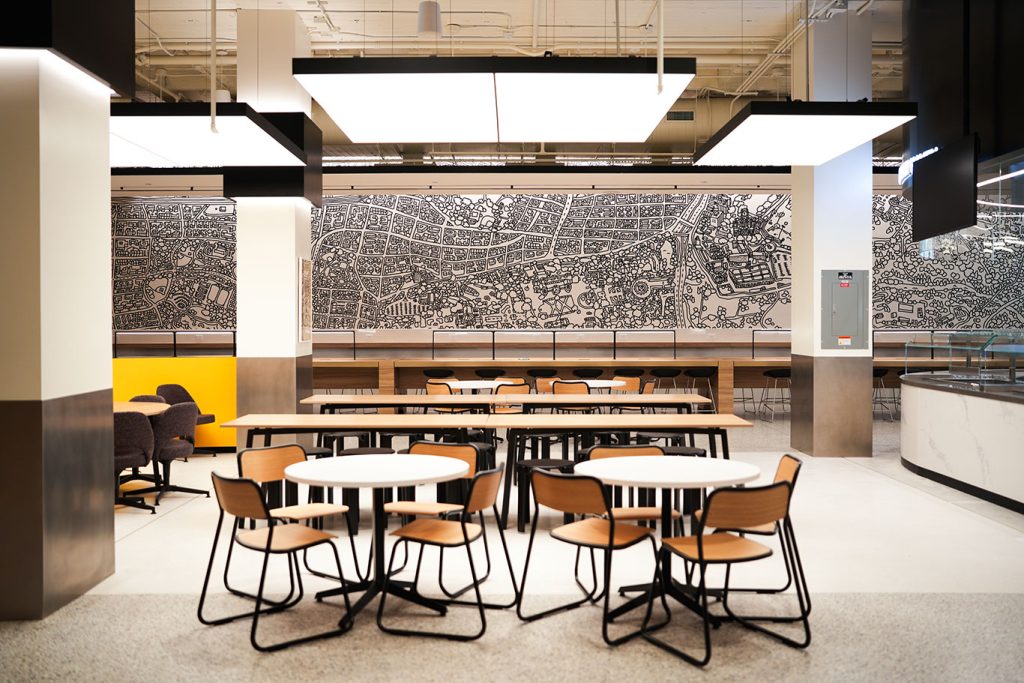
This piece was updated on September 30.
]]>Answering a call from Pope Francis, Fordham is indeed a place committed to taking “concrete actions in the care of our common home.”
Here are some updates from the first quarter of 2024, from student sustainability interns to “cool” foods to fun community events that make an impact.
Facilities
In January, 11 more undergraduate students joined Fordham’s Office of Facilities Management as sustainability interns to help the University in its efforts to reduce its carbon emissions. They’re working on projects connected to AI-enabled energy systems, non-tree-based substitutes for paper, and composting. The office is still looking for three more students to join; email Vincent Burke at [email protected] for more information.
Dining
Stroll into a dining facility at the Rose Hill or Lincoln Center campus, and you’ll find “Cool Food” dishes such as crispy chicken summer salad, California taco salad, and spicy shrimp and penne.
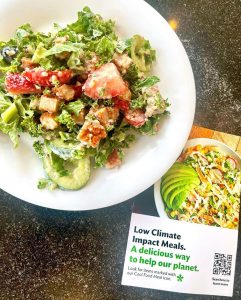
The dishes, which are marked by a distinctive green icon at the serving station, have a higher percentage of vegetables, legumes, and grains, which generally have a lower carbon footprint than those with beef, lamb, and dairy. According to the World Resources Institute—which Fordham partnered with on the Cool Food project—more than one-quarter of the world’s greenhouse emissions come from food production.
In March, the University went one step further by signing onto the New York City Mayor’s Office Plant-Powered Carbon Challenge. The pledge commits Fordham and Aramark to reduce our food-supply carbon emissions by a minimum of 25% by the year 2030.
Academics
This semester, a new one-credit, university-wide experiential learning seminar titled Common Home: Introduction to Sustainability and Environmental Justice was taught by faculty and staff from the Gabelli School, the Center for Community Engaged Learning, the Department of Facilities, the Department of Biology, and the Department of Theology.
Other sustainability-focused courses this semester include the City and Climate Change, the Physics of Climate Change, and You Are What You Eat: the Anthropology of Food (Arts and Sciences); Sustainable Reporting and Sustainable Fashion (Gabelli School of Business); and Energy Law and Climate Change Law and Policy (Law).
Did You Know?
Like most buildings in New York City, the ones on the Rose Hill campus get almost all of their power from power plants fueled by natural gas (along with some solar power). To power a building like Walsh Library, a natural gas-powered plant normally uses 37 million gallons of water annually. But fuel cells like the ones that were installed at the Walsh Library in 2019 actually make their own water, and as as result, Fordham is saving the community the equivalent of 57 Olympic-sized pools each year.
Students Take the Lead
At Fordham Law School, the student-run Environmental Law Review hosted a March 14 symposium that considered the impact of artificial intelligence on environmental law. Panels focused on how regulators and litigators can use AI and the challenge of addressing AI-generated climate misinformation.
In January, Fordham Law student Rachel Arone wrote The EPA Rejected Stricter Regulations for Factory Farm Water Pollution: What This Means, Where Things Stand, and What You Can Do for the Environmental Law Review. And the Law School’s student-faculty-staff collective Climate Law Equity Sustainability Initiative held a series of lunchtime discussions about climate change, law, and policy.
Student groups LC Environmental Club and Fashion for Philanthropy teamed up on March 8 to create reusable tote bags on International Women’s Day. The bags were donated to Womankind, which works with survivors of domestic/sexual violence and trafficking.
The United Student Government Sustainability Committee continues to run the Fordham Flea, a student-run thrift shop that connects students interested in selling old clothes with those looking to buy sustainably. The next flea will take place on April 26 from 11 a.m. to 2 p.m. outside of the McShane Center.
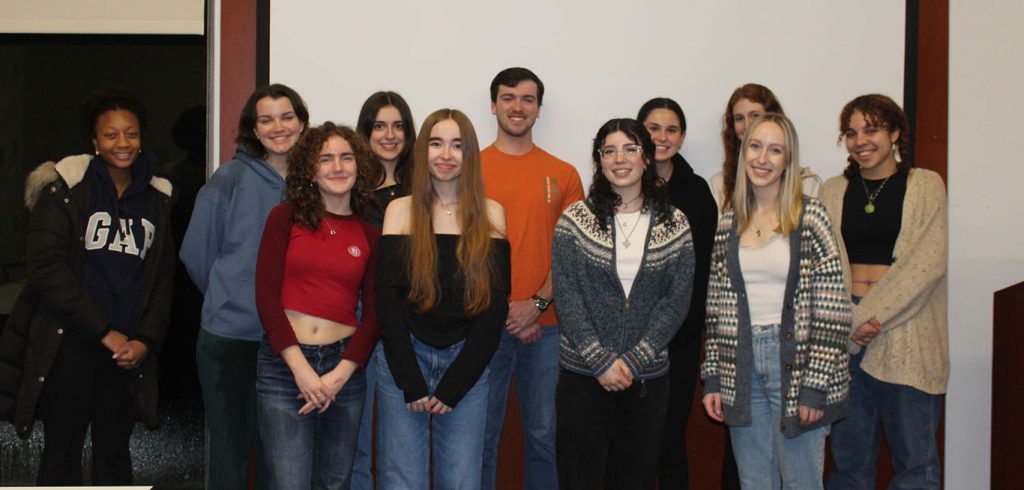
Community Engagement
The Center for Community Engaged Learning (CCEL) held an Urban Agriculture and Food Security Roundtable on Feb. 2. The gathering brought together community organizations and leaders from the Bronx to discuss urban agriculture and food security. Attended by Bronx Congressman Ritchie Torres, the meeting was also an opportunity for groups to learn about resources available from the USDA and the New York City Mayor’s Office on Urban Agriculture.
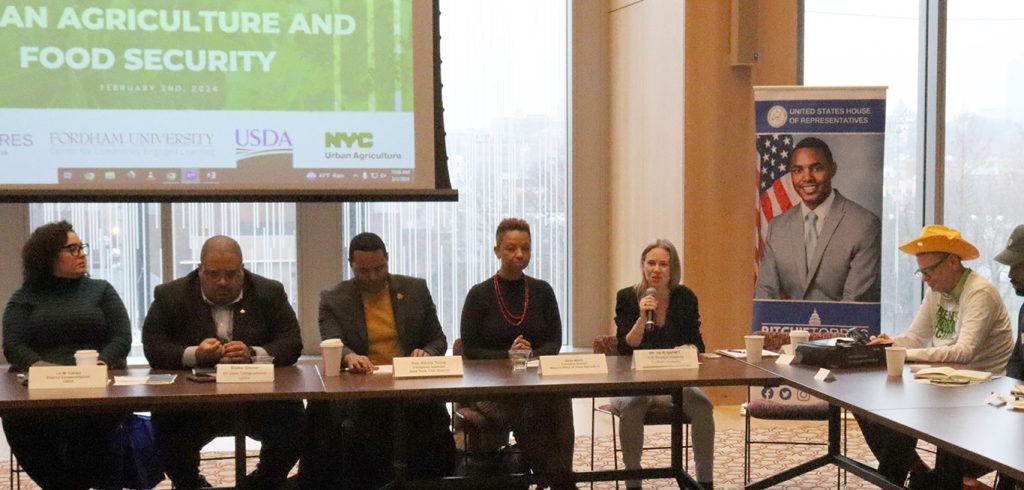
CCEL Director of Campus and Community Engagement Surey Miranda-Alarcon served as a panelist at a March 9 climate justice workshop at SOMOS 2024 in Albany, along with Mirtha Colon, GSS ’98, and Murad Awawdeh, PCS ’19.
Faculty News
David Gibson, director of the Center on Religion and Culture, and Julie Gafney, Ph.D., director of the Center for Community Engaged Learning, attended “Laudato Si’: Protecting Our Common Home, Building Our Common Church” conference at the University of San Diego on Feb. 22 and 23.
Marc Conte, Ph.D., professor of economics, and Steve Holler, Ph.D., associate professor of physics, presented their research around air quality, STEM education, and education outcomes on March 11 at the first night of Bronx Appreciation Week, which the Fordham Diversity Action Coalition organized.
Alumni
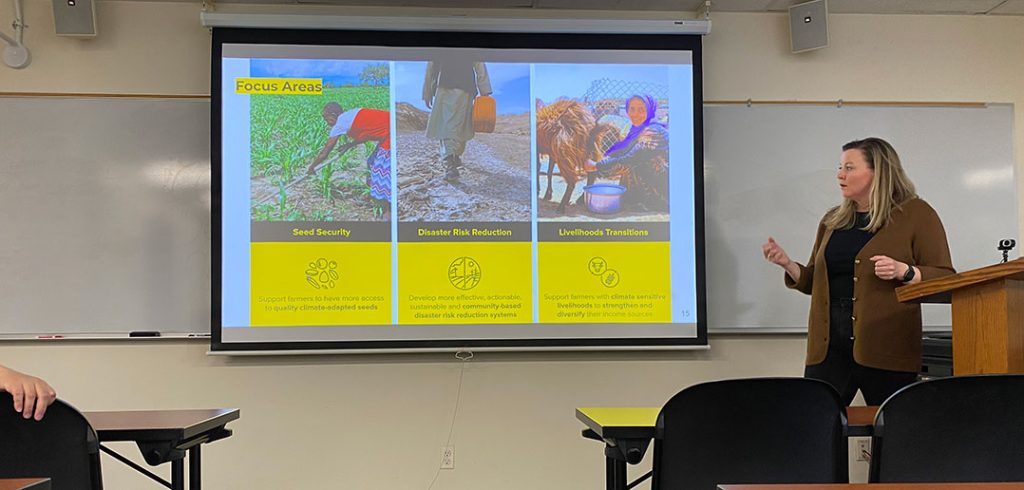
On March 14, Tara Clerkin, GSAS ’13, director of climate research and innovation at the International Rescue Committee, delivered a lecture at the Rose Hill campus titled “The Epicenter of Crisis: Climate and Conflict Driving Humanitarian Need and Displacement.”
In Case You Missed It
Here are some sustainability-related stories that you may have missed: In January, economics professor Marc Conte published the findings of a study that examined whether people living in areas with more air pollution suffer more from the coronavirus. The Gabelli School of Business partnered with Net Impact, a nonprofit organization for students and professionals interested in using business skills in support of social and environmental causes. A group of the Gabelli School Ignite Scholars traveled to the Carolina Textile District in Morgantown, North Carolina, to learn the benefits of sustainable and ethical manufacturing.
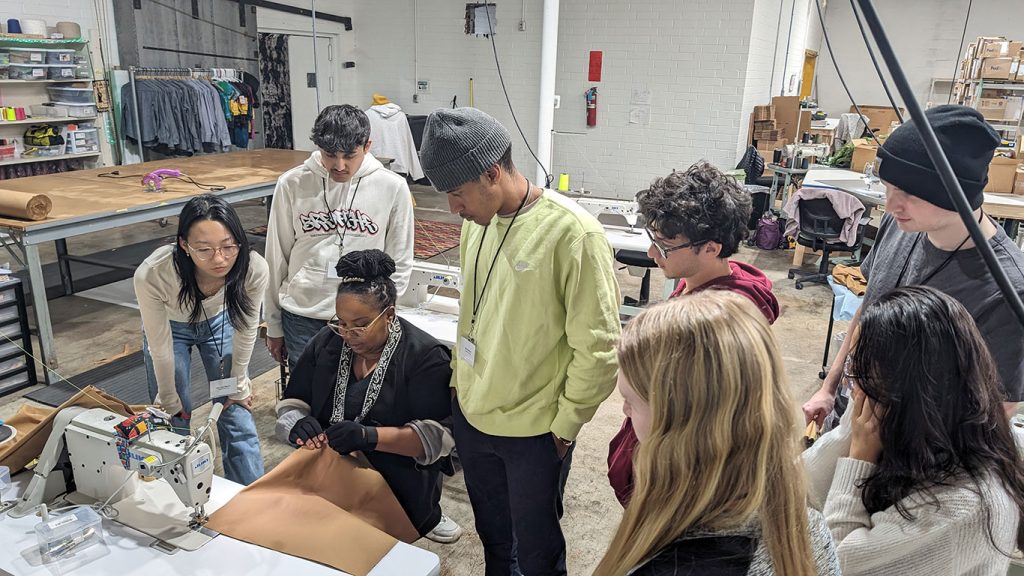
Upcoming Events
April 12 and 19
Poe Park Clean-up
In celebration of Earth Day on April 22, the Center for Community Engaged Learning is organizing visits to the park, where volunteers can help pull weeds and spread mulch. 10 a.m. – 2 p.m., 2640 Grand Concourse, the Bronx. Sign up here.
April 13
Bird Watching in Central Park
Law professor Howard Erichson will lead students on a birdwatching tour of Central Park, where they hope to spot and identify a few of the hundreds of species that pass through Fordham’s backyard on their annual migration routes. Meet at the Law School lobby at 9:30 a.m. Contact [email protected] to reserve a spot.
April 13
Ignatian Day of Service
Students and alumni will meet at the Lincoln Center campus and walk over to nearby Harborview Terrace, where they will build a community garden with residents. Lunch and a conversation about Ignatian leadership will follow. 10 a.m. – 2 p.m.
Click here to RSVP.
April 15
ASHRAE NY Climate Crisis Meeting
The theme of this meeting of the American Society of Heating, Refrigerating, and Air-Conditioning Engineers is “Challenge Accepted: Tackling the Climate Crisis.” All are welcome.
7 a.m.- 1 p.m., Lincoln Center Campus. Contact Nelida LaBate at [email protected] for more information or register here using code FordhamStudent2024.
We’d Love to Hear From You!
Do you have a sustainability-related event, development, or news item you’d like to share? Contact Patrick Verel at [email protected].
]]>The document set forth an ambitious seven-year plan for the University that touches on everything from facilities and curriculum to student involvement, all with the ultimate goal of combating climate change.
Just this month, Fordham received a $50 million grant from the Environmental Protection Agency that the University will use to team up with community partners to address the issue.
Below are a few of the sustainability-related efforts, developments, and accomplishments that took place in the final quarter of 2023. Look for more updates in 2024!
Facilities
Going Hybrid
On Oct. 23, three hybrid minivans, including a wheelchair-accessible minivan, joined the fleet of Fordham’s Ram Vans. They replace gas-powered minivans previously used for wheelchair-accessible requests, trips to the Calder Center, and charter trip services. The vans use less gas, produce less CO₂, and can run up to 560 miles on one tank of gas.
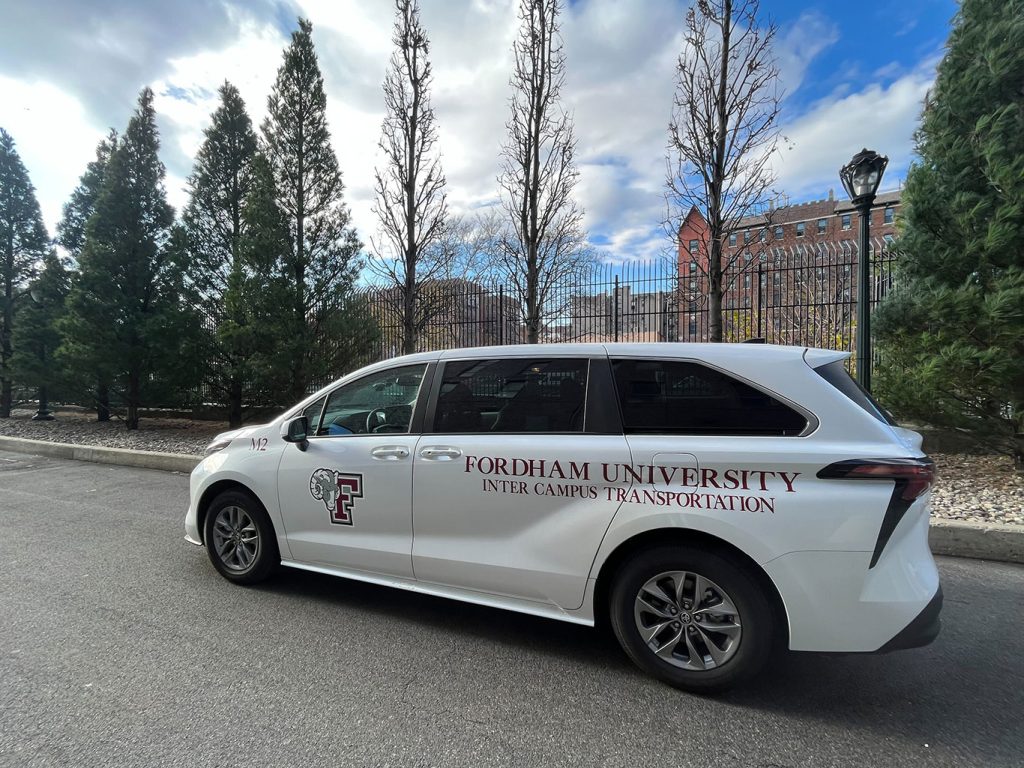
Dining
Micro Farms
This fall, Aramark installed vertical hydroponic units called Babylon Micro Farms at dining halls on the Lincoln Center and Rose Hill campuses. They grow fresh greens and herbs in a water-based solution (instead of soil, which requires frequent watering.) The greens are harvested for use in dining hall dishes and special student events.
Compared to traditional methods, each micro farm uses 96% less water, zero pesticides, 65% less fertilizer, and zero miles to transport. As a result, between January and June 2023, using them allowed Fordham to save 19,247 gallons of water, prevent 2.5 pounds of nitrogen from entering waterways, and reduce 32 pounds of food waste.
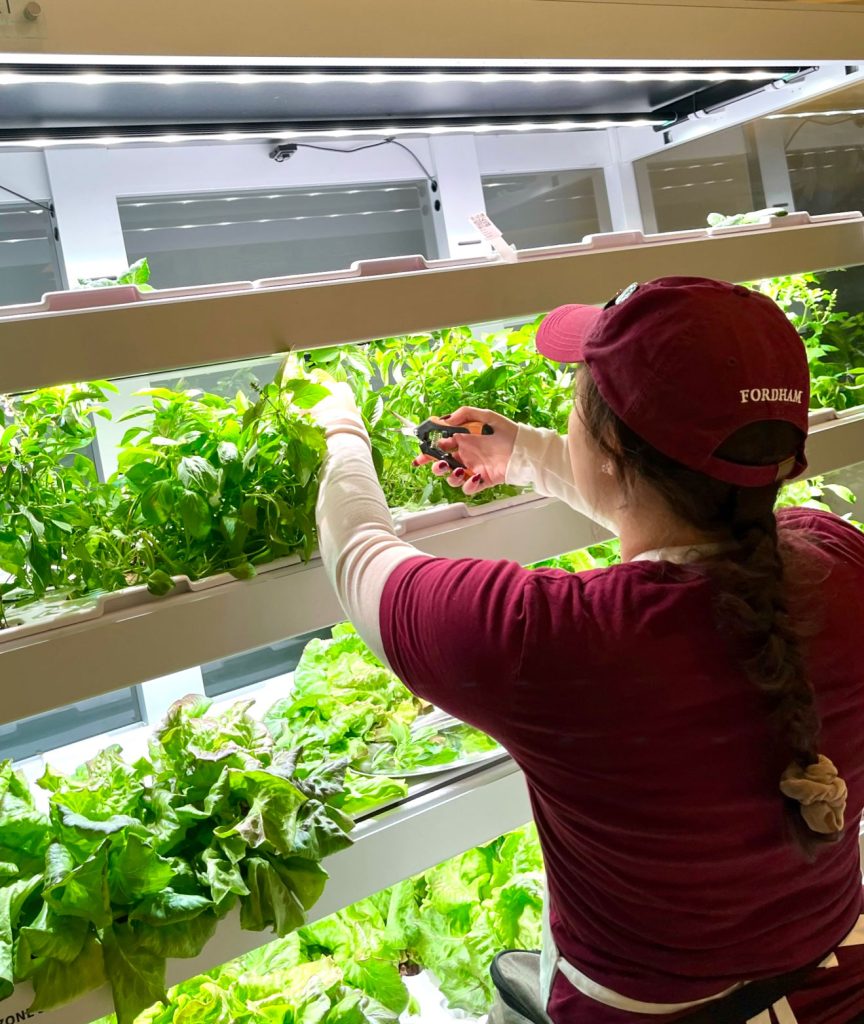
Academics
In the Classroom
Six undergraduate community-engaged learning classes offered in the Fall 2023 semester featured elements promoting sustainability: Anthropology of Food (Anthropology), Economics and Ecology of Food Systems (Economics), Thinking Visually (Visual Arts), Human Physiology (Biology), Consumer Behavior (Gabelli School of Business), and Leadership Integrated Project (Gabelli School of Business). At Fordham Law School, environmental law courses offered this semester included Environmental Law and Energy Law.
Fordham Law students wrote blog posts for the school’s Environmental Law Review on the Flint and Jackson water crises, NYC Local Law 97, the environmental damage caused by the fashion industry, and cell-cultivated meats.
Reading Laudato Si’
The Curran Center for American Catholic Studies held three seminars on Zoom this semester dedicated to reading Pope Francis’ encyclical Laudato Si’ and the 2023 follow-up, Laudate Deum. Visit the center’s website for more information on future seminars.
A Systems Approach
This semester, the Social Innovation Collaboratory and Career Center hosted a collaborative workshop on systems thinking, focused mainly on sustainability. The workshops, which were open to all undergraduate students, allowed them to explore the practice and application of systems thinking, which is rooted in a holistic approach to society’s more complex issues. The process is attractive to companies since it’s rooted in the idea of looking at complex problems with a new perspective. Contact Sadibou Sylla at the Collaborary for information on future workshops.
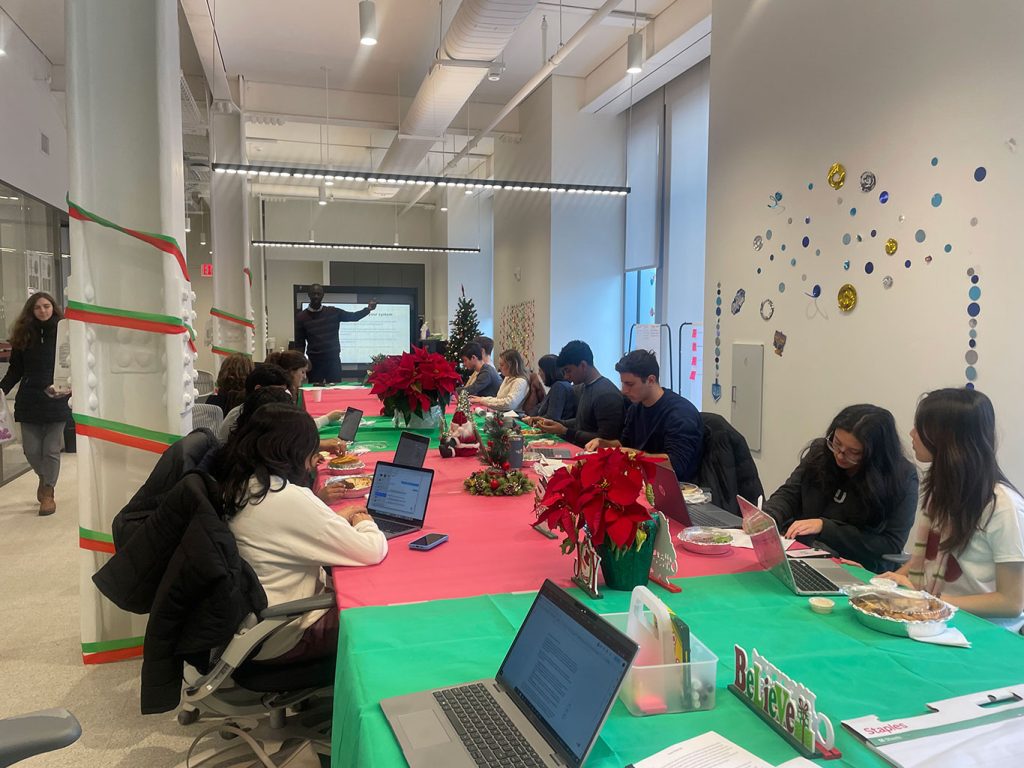
Students Take the Lead
Green Week: United Student Government sponsored Fordham College at Rose Hill’s Sustainability Week in November. It featured the Fordham Flea Pop-Up as well as a seminar on composting basics.
The Lincoln Center Environmental Club held a clean makeup tabling event on Nov. 30 to showcase the benefits of cruelty-free and clean makeup.
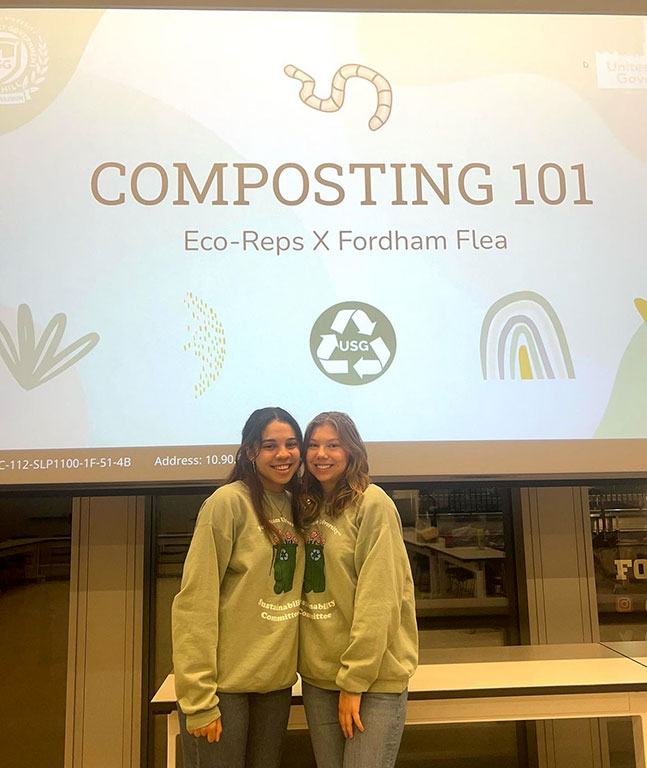
Community Engagement
As part of the Reimagine the Cross Bronx campaign, Fordham staff conducted weekend “walkshops” in the neighborhoods surrounding the highway. Funding came from a $25,000 grant from the New York City Department (DOT) that the Center for Community Engaged Learning received in October.
Fordham staff and students also held special Halloween and Thanksgiving-themed events at the Highbridge Farmers Market and community space, which was recently expanded thanks to an AARP grant.
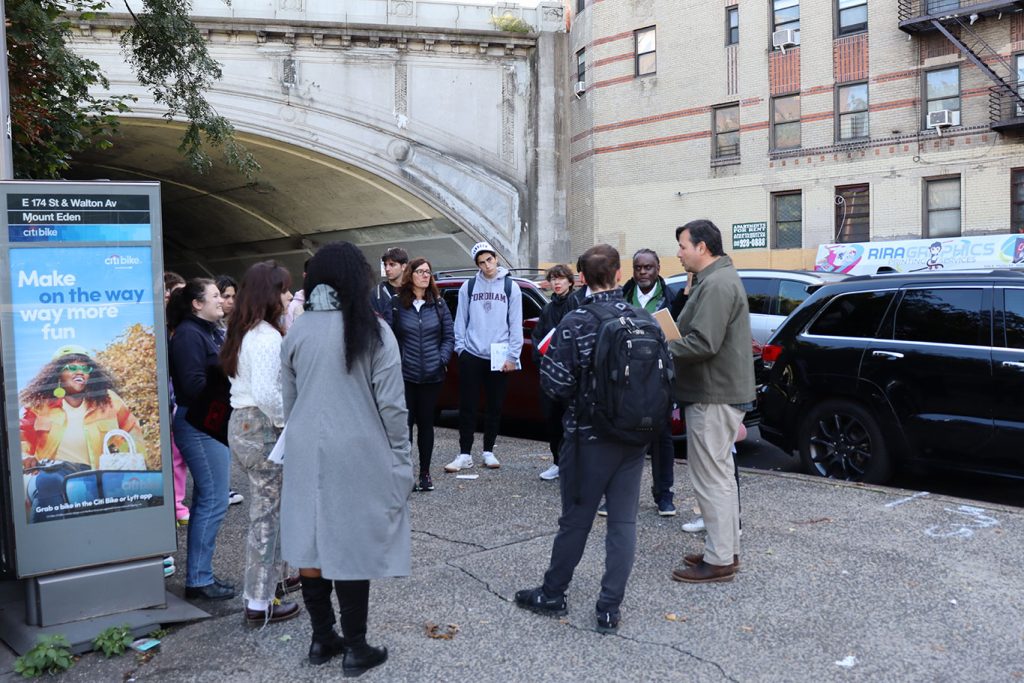
Faculty News
Marc Conte, Ph.D., professor of economics, published “Unequal Climate Impacts on Global Values of Natural Capital” in the journal Nature.
Stephen Holler, Ph.D., associate professor of physics, published “Education for Environmental Justice: The Fordham Regional Environmental Sensor for Healthy Air,” in the journal Social Sciences.
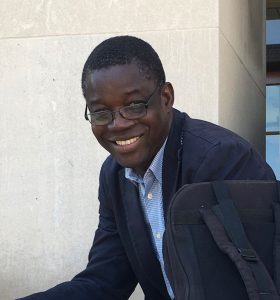
David Gibson, director of the Center for Religion and Culture (CRC), received $84,840 from the Porticus Foundation for the annual conference The Way Forward: Laudato Si’, Protecting Our Common Home, Building Our Common Church. The conference will take place in February at the University of San Diego.
Isaie Dougnon, Ph.D., associate professor of French and Francophone Studies and International Humanitarian Affairs, received $24,790 from the Wenner-Gren Foundation for research based on a local perspective on water and migration in West Africa.
Alumni
Giselle Schmitz, GSAS ’22, spent this fall working with the Coral Triangle Center in Bali, Indonesia—a nonprofit that connects governments, corporations, and local groups to help strengthen marine resources in the region.
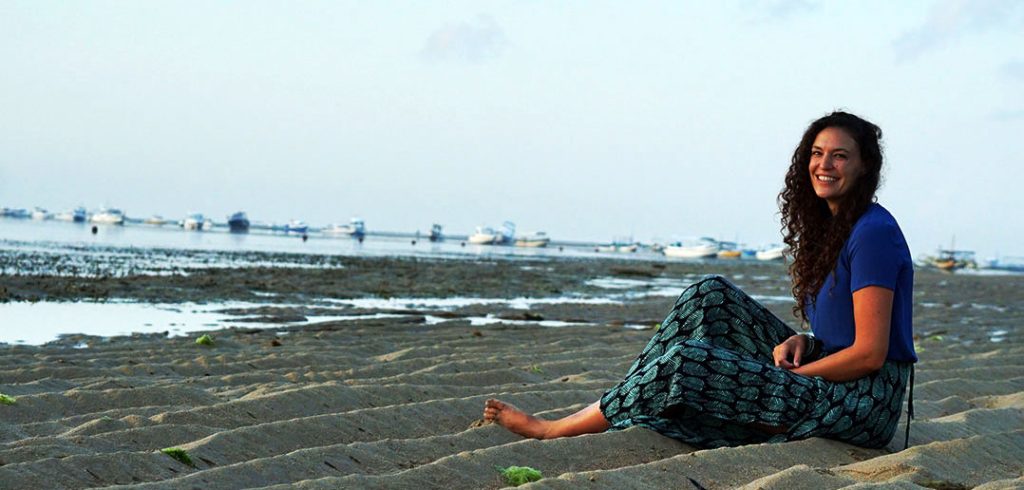
In Case You Missed It
It was a busy fall in terms of sustainability efforts! Here are some stories Fordham News covered that you may have missed: In October, the annual Fordham Women’s Summit focused on sustainability. In our theology department, a lecture for first-year students featuring Union Theological Seminary professor John J. Thatamanil connected religious supremacy to the destruction of the natural world. Four students have joined the Office of Facilities Management’s newly created internship program, while alumni are helping protect New York City’s birds and helping farmers adapt to climate change. The Gabelli School of Business hosted two Nobel Laureates at a conference on ESG. At the Law School, more than 20 students gathered in Central Park for a clean-up event for the annual Public Service Day, while alumna Melinda Baglio was honored for being a changemaker in the clean energy field.
Upcoming Events
Faculty Happy Hour: Sustainability and Environmental Justice
Open to all faculty interested in sharing ideas about sustainability.
Thursday, Jan. 18, 2024. RSVP: Julie Gafney, [email protected]
STEM Career Fair, Thursday, Feb. 15, Great Hall, Rose Hill Campus. Visit the Fordham Career Center next month for details.
Women of Color in STEM Career Panel, Wednesday, Feb. 28, Virtual. Visit the Fordham Career Center next month for details.
Social Impact and Non-Profit Micro-Fair, Thursday, March 14, 12th Floor Lounge, Lowenstein Center, Lincoln Center campus. Visit the Fordham Career Center next month for details.
Save the Date:
Climate Action Summit with President Tetlow: April 8, Rose Hill Campus
We’d Love to Hear From You!
Do you have a sustainability-related event, development, or news item you’d like to share? Contact Patrick Verel at [email protected].
]]>